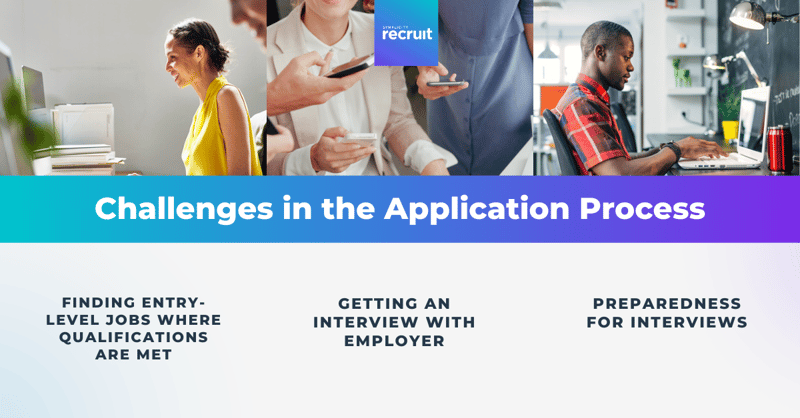Not unlike generations before them, for Gen Zers entering the workforce, finding entry-level opportunities that align with their education, experience, and interests comes with challenges. This generation is looking for employers willing to hire entry-level talent with qualifications that go beyond traditional metrics and, instead, focus on things like leadership and problem-solving skills.
Our 2023 student survey dives deeper into the biggest challenges Gen Z faces when finding entry-level jobs they're qualified for and their top reasons for feeling discouraged from applying for open roles they're interested in.
Here's what we found out:
Finding entry-level jobs where qualifications are met is harder than it seems

Many employers are interested in looking for applicants with more experience than they can realistically offer. Our 2023 student survey found that 60% of Gen Z college students feel it's hard to find an open role for which they can meet all the qualifications.
Depending on the industry students are applying to or the type of jobs they're looking for, college students complain that some job descriptions have too many desired qualifications and require unrealistic years of experience for entry-level roles. In fact, "One recent study [by Talent Works] found that 61% of full-time, entry-level job postings required 3+ years of experience." This is not something that many first-year graduates have, as many did not get to partake in traditional training or internship programs during the pandemic that would allow them to attain the necessary experience some companies look for in entry-level applicants.
It's something that many in the early talent space are calling "experience inflation" -- the idea that open entry-level roles are not really entry-level. A great cover letter and resume don't necessarily cut it anymore when it comes to some of the most popular careers if the experience doesn't match what the employer is looking for. This is an increasing source of frustration for Gen Z applicants trying to break into desired careers and programs and will even deter students from submitting an application.
Even after getting through the application process, Generation Z struggles to get an interview with an employer
In their quest for the ideal first job, this new generation of graduates must overcome a series of hurdles before an offer is extended. While the application process is often tedious and frustrating, getting to the interview part is just as difficult. Our research shows that 56% of students cite having difficulties in getting a job interview as one of the biggest challenges in the application process.
One pain point for Gen Zers without much experience is their ability to stand out on their resume, which often prompts recruiters to ghost candidates who do not meet the minimum requirements. Although frustrating, not every candidate is going to get a job offer.
When applicants don't meet requirements
Although many students complain that some job descriptions require too much of entry-level applicants, not every applicant is going to meet all the desired qualifications a company may want. That means employers are in a position in which they have to reject candidates that don't align well with their vision for a specific role.
To save time for both the applicant and the employer, it's important to make sure job descriptions are clear. Offer an example of a type of project or a "day in the life of" so that applicants know what kind of job application they're investing their time in.
Our research shows that 55% of students feel they need more preparation for interviews and other assessments
One of the top concerns for students entering the workforce is their level of preparation for the interview and job search process. No matter the level of education students are graduating with, more than half of the students we surveyed are not confident in their interview skills. As college graduates, this is the first time that they're stepping into the real world and applying to jobs that will hopefully turn into life-long careers. There's a lot of pressure on them to find fruitful careers right out of college that meet all their expectations.
As students navigate interviews and assessments, it'd be helpful for them to get tips from the employers they're interviewing with so that they can improve their skills and not feel so nervous about conversations with recruiters. This is a good way for employers to stand out in the candidate's mind and humanize a process that can be very daunting for entry-level candidates.
To learn more about this topic and more, download our free report below.